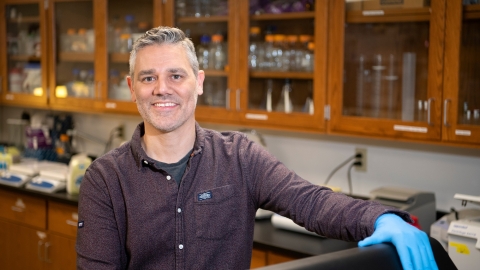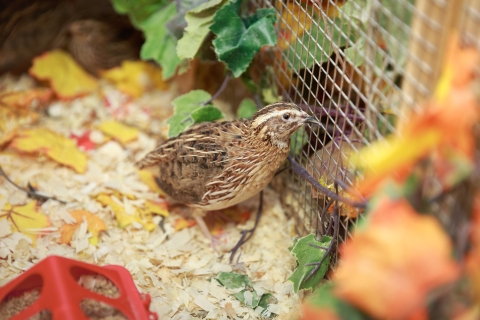
Bucknell Study Finds Impact of Prenatal Stress on Offspring Stress Response
April 25, 2023
Professor Mark Haussmann, biology, studies the effects of acute prenatal stress. Photo by Emily Paine, Communications
A new study by Bucknell University Professor Mark Haussmann, biology, and 14 former students from his lab has found that individuals who are exposed to stress hormones during prenatal development appear to be more sensitive to handling stress as adults, but they also have a harder time turning those stress responses off — potentially leading to other health consequences.
The study, conducted with Japanese quails — which have similar endocrine systems to humans — was published last week in ScientificReports - Nature.

Haussmann uses Japanese quails in his research. Photo by Bucknell University
"Stress and challenges are a part of life. Our work suggests that mothers living in stressful environments may pass a signal to their developing offspring to modulate that development to better cope in those environments. However, that benefit may be tempered by having a stress response that is tough to turn off," Haussmann says.
In the study, laid eggs were immediately sorted into one of two groups: a control injected with a placebo and an experimental group injected with a small physiological dose of corticosterone — the primary avian stress hormone. The Bucknell team then let the eggs hatch and monitored the birds through the rest of their lives.
When individuals in both groups were given the same mild stressful experience as adults — a short period of isolation from their pen mates — the researchers found profound differences in the way the two groups handled that stress.
"The individuals who received the prenatal one-time stress hormone treatment were able to react with a stress response much more quickly, which is probably a good thing in a stressful environment," Haussmann says. "There's a possible scenario that a mother is giving her offspring a peek into the world in which they're being born. If that world is a stressful place — a constant threat of harm, or one where food availability is unpredictable — it might be beneficial to give your offspring notice, so they can fine-tune their physiology to more easily respond to that world."
But while the researchers found that the individuals from the stress hormone-treated eggs could mount a response more quickly to the stressful event compared to the control group, they also weren’t as quick to turn the stress response after the isolation stress had passed.
"This is of particular interest because recent work in humans suggests that there is a link between how fast we can turn a stress response off and our health," Haussmann says. "In the short term, these hormones are super beneficial — they allow us to mobilize energy, change behaviors, and turn off systems in our body focused on long-term health, like our immune system, to conserve energy in the present, and survive the immediate challenge. But when these hormones are left unregulated, and they begin to circulate in our bodies for long periods, the benefits evaporate. Rather than inhibiting the immune system for an hour to conserve energy, it is shut down for weeks."
This type of dysregulation can wreak havoc on our bodies, according to Haussmann. "It is important to remember that the potential positives of prenatal stress exposure may help an individual survive in the short-term, but that may be paid back with long-term health costs," he says.
Haussmann advises expectant mothers to try to limit severe stress during pregnancy.
"Some stress during pregnancy is absolutely normal. Your body is experiencing a lot of changes," he says. "But hopefully you can find the time to do the things you enjoy. If you love exercising, then exercise. If you hate it, and it stresses you out, then don’t overdo it.
"I started exploring these research questions when my wife was pregnant with our first daughter, and the last thing I wanted was to give her something to worry about! Our solution was to laugh a lot and do the things that made us happy. It's hard to be stressed when you’re both giggling over morning coffee."
The research was supported, in part, by funds from the National Institutes of Health. The Bucknell researchers will continue to study the effects of acute prenatal stress.

